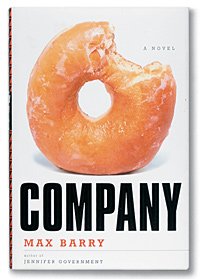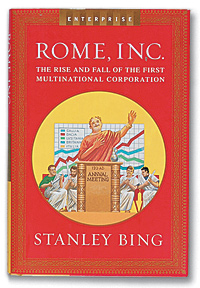Best Business Books: Fiction
Fun on the Side
(originally published by Booz & Company) Max Barry,
Max Barry,
Company: A Novel
(Doubleday, 2006)
Douglas Coupland,
JPod: A Novel
(Bloomsbury, 2006)
Tom Perkins,
Sex and the Single Zillionaire: A Novel
(Regan Books, 2006)
Stanley Bing,
Rome, Inc.: The Rise and Fall of the First Multinational Corporation
(W.W. Norton, 2006)
The business world suffers no shortage of great narratives, and the past 10 years have offered a particularly rich crop: Ken Lay, the country preacher’s son made good, building an immense empire, only to be brought down by greed, arrogance, betrayal, and the doggedness of the Wall Street Journal. Dennis Kozlowski, regal in his excesses, using his company as an underwriter of decadent parties and absurd household extravagances, uncomprehending of his sins right up to the end. Steve Jobs, reclaiming the techno-cult that had ejected him 15 years before and again making it the greatest consumer technology innovator of our times. Bill Gates, Andy Grove, George Soros, Rupert Murdoch, all heroes of a sort in our money-worshipping world, but complex men with brilliance and drive.
Perhaps it is because the material is so rich that when we think of great business storytelling, we think of nonfiction: Michael Lewis in Liar’s Poker riotously revealing the inner workings of Wall Street, or Connie Bruck and The Predators’ Ball seating us on the great stage of high-stakes corporate warfare. Even the trenchant social critique of capitalism, once the province of the fiction of Sinclair Lewis and Theodore Dreiser, tends these days to take a nonfiction form. Michael Moore in Roger and Me, Barbara Ehrenreich in Nickel and Dimed — these are our watershed dramas.
When it comes to business fiction, only Tom Wolfe — in Bonfire of the Vanities and A Man in Full — truly captures modern capitalism and its singular culture, the comic marriage of great wealth and power on the one hand and human vanity and superficiality on the other. The bankers working the overextended property developer in an Atlanta conference room, with a laserlike focus on the ultimate goal: the “saddlebags” of underarm sweat that will confirm they’ve got their man. Now that’s storytelling!
Mr. Wolfe, of course, is partly a satirist, and it is in satire that this year’s crop of business fiction makes its mark. It’s by and large pretty light stuff, making the most of the many easy targets provided by corporate culture, and sitting easily within the hackneyed Hollywood setup of evil corporation versus earnest working man. But there are some good laughs to be had there.
 Nailing the Salesman
Nailing the Salesman
Company, by Australian novelist Max Barry, features a donut on the cover, but lest you think the book is a parody of Krispy Kreme (as with the great nonfiction narratives above, that story is so over-the-top it’s hard to mock), the donut in fact represents the flashpoint of intradepartmental war at a big company called Zephyr Holdings. Somebody in the training sales department has taken an extra donut at the morning meeting, leaving a colleague without. Or perhaps it was food services that didn’t leave enough? Whatever the case, the stakes are high, or at least they are for the obnoxious and scheming Roger. Little does he know that his campaign to find, and have fired, the perpetrator will soon be rendered meaningless by a larger conflagration ignited by a newcomer named Jones.
Jones, a sales assistant with a fresh MBA, comes to discover that all of the customers of the training sales department are other departments of Zephyr Holdings, and he finds this rather curious. Egged on by his sister, a sort of deus ex machina of rationality, he sets out to discover what Zephyr Holdings really does. When he finds out, and is recruited to be a double agent for management by a sexy blond executive masquerading as a receptionist, all sorts of extreme corporate hijinks ensue.
The plotline of Company is too clever by half, and the characters are little more than cartoons. Even Jones, the hero, is strangely unsympathetic and unbelievable; if he’s so damn smart, why does he subject himself to all this nonsense, and eventually befriend and defend the pathetic corporate drones around him?
Cartoons, though, have their place, and Mr. Barry offers some solid belly laughs with his dead-on caricatures of certain business types:
On level 14, Elizabeth is falling in love. This is what makes her such a good sales rep, and an emotional basket case: she falls in love with her customers. It is hard to convey how wretchedly, boot-lickingly draining it is to be a salesperson. Sales is a business of relationships, and you must cultivate customers with tenderness and love, like cabbages in winter, even if the customer is an egomaniacal asshole you want to hit with a shovel. There is something wrong with the kind of person who becomes a sales rep, or if not, there is something wrong after six months.
Mr. Barry pays close attention to the details of the cubicle world, to great effect, and his ear for the workplace medley of middle-management maneuvering and random cubicle patter is unerring. Witness this scene, as Freddy, the worrywart, no-future assistant tells his office mate Wendell about a conversation he overheard Sydney, the department head, having:
“Sydney’s been on the phone to upstairs. It’s about cost-cutting, isn’t it? Somebody’s getting canned.”
“Sydney’s talking to upstairs?”
“That’s what Megan says.”
“Well, that could mean anything. Don’t jump to conclusions. Hak-kah.”
“Hey, guys,” Elizabeth calls across the aisle. “Are you having trouble with the network? I just e-mailed Wendell and it bounced back.”
“Haven’t checked,” Roger says, not looking up.
“What was your e-mail?” Wendell says.
“I’m selling raffle tickets for the social club. Want to buy some? You can win a set of golf clubs.”
Company is dedicated to Hewlett-Packard, where Mr. Barry once worked, and you can think of it, in Hollywood terms, as HP meets Gilligan’s Island. More sitcom than novel, in the genre of slapstick rather than comic drama, Company is a very amusing if not ultimately very penetrating read.
Digital Drones
In Generation X (St. Martin’s Press, 1991) and Microserfs (Regan Books, 1995), Douglas Coupland proved he had the rare talent to successfully capture the zeitgeist of a certain social class. His latest book, JPod, picks up the theme: the depressingly empty lives of the smart, creative 20-somethings who toil in the bowels of the technology business. The JPod is a dysfunctional group of video-game developers trying to make their way in a dysfunctional company (one that bears a suspicious resemblance to Electronic Arts), and even though our hero, Ethan, succeeds in hooking up with the new girl in the pod, the story is a strangely grim tale of 21st-century ennui. The new boss is ruining their project for the sake of a stupid private agenda; Ethan’s parents are philandering drunks, pot growers, and casual killers who seem to lead much more interesting lives than any of the JPod kids; the most sympathetic character is a Chinese gangster who just needs a little love.
Mr. Coupland himself even makes an appearance, and a not-very-heroic one at that. It’s a jarring device, and I didn’t quite get the point, unless it is to show that the author doesn’t consider himself to be above his trapped and defeatist characters. As with Company, it’s a little hard to relate: Is the job market in Vancouver, where the novel is set, really so bad that the young, educated, and computer savvy don’t have any options?
Perhaps I’m being too literal. I guess the point is that most jobs in the digital age are deeply alienating, and, in case you missed it, Mr. Coupland offers a summary in another one of the book’s oddities, an end-of-section, stream-of-(whose?) consciousness sidebar: “Like any company, Sony is comprised of individuals who are fearful for their jobs on a daily basis, and who make lame decisions based pretty much on fear and conforming to social norms — but then, that’s every corporation on earth.…”
Paradoxically, JPod the book has a certain manic energy, in contrast to the desultory JPodders. Mr. Coupland’s tableau extends far beyond the workplace, and he does especially well with certain set pieces: the militant lesbian mother on her commune, the frantic trek to the industrial hinterlands of China, the group effort to dig up a body that’s buried beneath a fern outside a garish new McMansion. There are lots of drugs, and the amusing transformation of the idiot marketing VP into an affable heroin addict tamps down the temptation to interpret the book as a sobriety lecture. And Ethan is ultimately kind of sweet.
With most satire, the closer you are to the subject matter the more you’ll appreciate it, and maybe I just haven’t spent enough time smoking pot and playing video games with Vancouver post-grads to fully appreciate this book. Mr. Coupland writes with great verve and imagination, but this time at least his aim is not always quite right.
The Good Life
Sex and the Single Zillionaire isn’t really about business, except insofar as it’s about the author, Tom Perkins. A legendary tech investor and cofounder of Kleiner Perkins Caufield & Byers, the venerable Silicon Valley venture capital firm, Mr. Perkins is known to be a smooth and sociable man who appreciates the good things (yachts, private chefs, luxury homes) that immense wealth can bring. The main character in the book is autobiographical, and, since I’ve never met the man, I can only speculate as to whether the real Mr. Perkins is such a nice guy. But no matter.
Sex and the Single Zillionaire is obviously the work of an amateur, with some painfully bad writing and a story line so predictable that you know what’s going to happen practically from the first page. But the pacing is pretty good, and it has a surprisingly strong voyeuristic appeal that keeps you turning the pages. Danielle Steel, the author’s former wife, who is cited fulsomely in the dedication and acknowledgments, was clearly a big help.
The single zillionaire of the title, one Steven Hudson, is a successful businessman who has been feeling down in the dumps since his beloved wife died. Jessica James is a beautiful-but-struggling reality TV producer who comes up with a potentially career-saving idea: a show called Trophy Bride, in which hot young things compete for the everlasting affection of, well, a man like Steven Hudson. She recruits him. He goes along because he has a crush on her. See what I mean about being able to guess the rest?
Mr. Perkins has a knowing eye for the milieu of the ultrarich — the Gulfstream V, the charity balls, even the Entertainment Tonight–type TV crews scrambling for their quarry — and, among other things, they apparently like dark wood very much. There are the “mahogany paneled corridors” of the executive suite at Steve’s firm, the “old leather, old wood, old paintings” and “burnished dining room” of his club, the “carved oak paneling” of his Long Island mansion, the “beeswaxed, marquetry inlaid woods” of his Bentley, the “curved oak walls” of the yacht club, more “French polished mahogany panels” in his office, a “wood paneled” lounge at 21, the “exquisitely varnished” decks of his speedboat, and the “mahogany wainscot” and “mahogany-banistered” staircase on his motor yacht.
The would-be trophy brides are described in similar fashion, with “statuesque” figures and “marvelous breasts,” “goddesses” with “tanned bare arms and shoulders” and “radiant smiles,” forever looking “stunning” and “dazzling.” Fortunately, unlike the aforementioned wood, they actually do things. Unfortunately, mostly what they do is turn into ranting idiots, heartless grifters, or comical sex fiends at the drop of a hat. But again, no matter. The supporting cast — kids, servants, employees — is just plausible enough. Steve is smart and has a heart, ditto Jessie, and that’s enough of a story line to keep things moving. You don’t really get anywhere, but it’s not an unpleasant ride.
 The Roman Way
The Roman Way
Although not technically a work of fiction, my final selection accomplishes the satirical goal best of all — true insight through humor. Stanley Bing, the pen name of Fortune humor columnist and CBS PR executive Gil Schwartz, has carved out a nice niche for himself as a satirist of executive life. I used to read his column regularly but eventually tired of it — finding original ways to spoof executive life 26 times a year, year after year, is a tall order for anyone — and I’d almost forgotten how good a writer he is. In Rome, Inc., Mr. Bing tackles an improbable idea: casting the history of the Roman empire as a management parable, with the tongue-half-in-cheek thesis that Rome was the first great multinational and had to wrestle with organizational challenges no different from what corporations face today.
The most explicit analogies between Rome and the modern corporation, though meant as jokes, are the least interesting and least amusing aspects of Rome, Inc. Mark Antony is to Octavian as Bill Gates is to Steve Jobs. Get it? Me neither, and I read the book. But to focus on this is to miss Mr. Bing’s considerable achievement: He succeeds in painting a fairly coherent picture of how Rome worked and why, with a wry and witty use of corporate jargon and contemporary colloquialism that is a funny and refreshing antidote to the historian-speak that we usually have to navigate in reading about the ancient world. Indeed, it turns out that looking at Rome from a modern management standpoint is actually fairly enlightening, and in Mr. Bing’s able hands it’s also very entertaining.
Consider this description of the strategy behind Hannibal’s legendary invasion:
Hannibal Barca was one of the great out-of-the-box thinkers and strategic planners, and he didn’t give up until he lost the support of his own senior management — and, of course, a lot of lives along the way. Hannibal’s idea was to tie up Rome in Africa and then, with the help of the many little mom-and-pop operations that hated Rome in the south of France and northern Italy, invade the boot itself, and set up shop right on Rome’s doorstep, frightening the toga boys and eventually piercing the heart of the great corporation in its own hometown. How to get there? By the hardest way possible — over the Alps. In winter. Just exactly what any sane manager would never think of doing. And while we’re at it, let’s bring something that no Roman, no Italian has ever seen before: elephants. Big, scary, weird elephants. That ought to rock their world, huh?
As a potted history, that’s pretty good.
Mr. Bing makes a compelling, if ultimately obvious, argument that the Roman Empire was built on very clever management techniques, and that it survived as long as it did because middle management — the soldiers and merchants — remained committed despite the decadence of the senior executives. He’s perceptive and hilarious in his assessments of Caesar, Augustus, Antony, and the other great figures, and he’s merciless (and also hilarious) in his descriptions of the preposterously irresponsible and self-indulgent emperors who followed Caesar, such as Caligula and Nero. By the book’s end, the central joke starts to wear thin, but the sketches still work. Mr. Bing has obviously done his homework.
What stuck with me most in reflecting on Rome, Inc. is probably not something the author intended. For all the relevant analogies between Rome and multinational corporations, the fact is that modern companies do not resolve their internal disputes by having the board hack the CEO to death (or vice versa). Whatever their depredations and structural lack of concern for those lower down in the hierarchy, corporations do not build strategies based on hundreds of thousands of people dying violent deaths. Even in the most bitter family-business feuds, CEOs do not kill their mothers and force their daughters to bed potential rivals.
The extreme violence of Roman society is more striking in Mr. Bing’s telling than in most history books. That’s partly because it’s a running joke — corporate politics are a distraction from the real business of “hacking and slashing” — but partly because he’s unconstrained by the politesse of historians. And that’s a service in itself.
For its unlikely but highly successful combination of dead-on corporate satire and historical insight, Rome, Inc., is our pick for best book.![]()
Author profile:
Jonathan Weber (jonathan@newwest.net) is the founder and editor-in-chief of New West Networks, a collection of online communities focused on the culture, economy, politics, and environment of the Rocky Mountain West. He was formerly the editor-in-chief of the Industry Standard.


